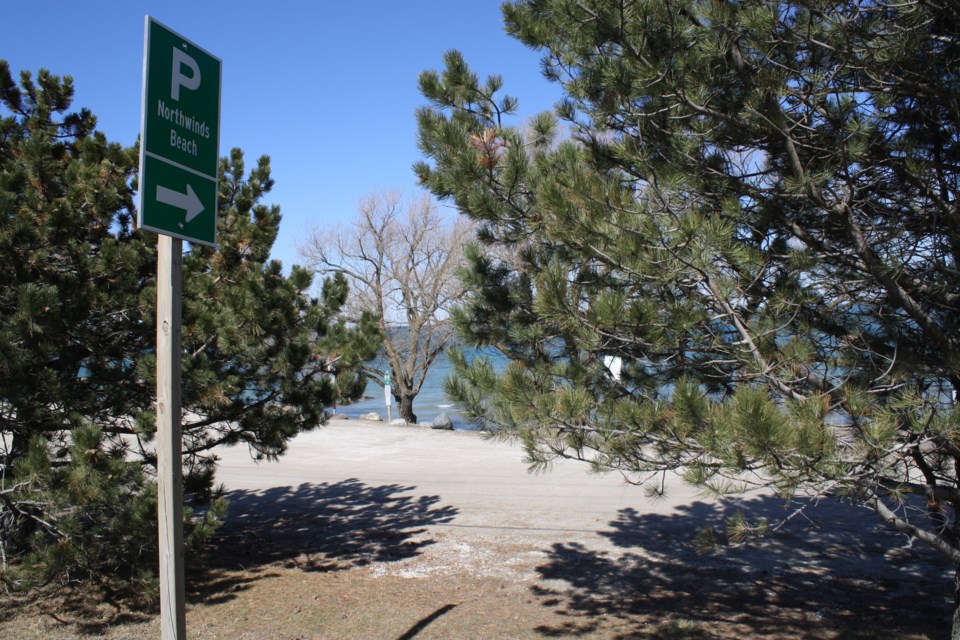The Town of the Blue Mountains (TBM) is moving forward with a paid-parking pilot that will see non-residents pay for parking at the town’s four busiest parks and waterfront locations.
“Staff are moving forward with this project. A request for proposals (RFP) will be released very soon,” says Ryan Gibbons, director of community services for TBM.
TBM will be establishing an app-based, pay-for-parking system at Northwinds Beach, Peasemarsh, the Thornbury Harbour, and Lora Bay Park.
“We often have a lot more tourists in these areas and it is creating pressures on those properties, especially when it comes to sanitation and garbage collection. What we are hoping to do is off-set some of those maintenance costs with these fees,” he explains.
Non-residents will be charged $10 an hour, at a maximum of $50 per day.
Anyone parking over six hours will be levied a parking fine. Town staff and council hope this will help to promote turnover at the parks.
Town residents will be receiving a parking pass that will allow them access to these sites for free.
TBM council had asked staff to explore the feasibility of this pilot in 2019. After conducting research, the project was added to and approved through the town’s 2020 budget.
The collected fees will help to off-set operational costs, as well as covering the entire cost of the program. Any additional revenue generated from the project will be put into the TBM general taxation fund.
“We have been able to learn a little bit from Grey Sauble Conservation Authority (GSCA) and they actually don’t have any enforcement at all and still receive significant revenues from the paid parking,” Gibbons says.
Tim Lanthier, CAO of GSCA says GSCA currently has app-based, paid-parking systems in place at eight of its properties.
“The app system has been very successful for us in terms of generating parking revenues that we otherwise would not be able to raise,” says Lanthier. “This puts some of the maintenance costs of the properties back on the actual property user, and reduces the burden on the municipal levy portion of our budget.”
Lanthier says GSCA has been using the Mackay Pay system since 2015, and the funds generated help to offset maintenance and staffing costs, property tax payments and investments into capital assets.
“Prior to this, we only collected parking fees at two properties via gatehouse staff. To put this in perspective, GSCA has over 200 properties in 80 groupings,” he says. “This is a great example of passing some of this cost onto the actual property users, thereby reducing the amount of money needed to be generated through a municipal levy. Currently, GSCA’s budget is approximately 50 per cent self-generated revenues.”
Lanthier adds the strategic positioning of these paid parking sites can also help to control or move crowds.
“Some of the properties that have paid parking also have free parking areas located further away from the main attractions, like Hibou Conservation Area, which has a small free parking lot for trail-access only,” Lanthier says.
In the TBM, signs will be posted where visitors will be asked to register and pay for parking through the downloadable application, website or phone number.
“The idea is that it is based on license plates,” says Gibbons. “There would be a handheld scanning device that would scan the license plate and identify whether that person has paid or not.”
Prior to COVID-19, TBM had planned to hire two bylaw enforcement officers to oversee the program. The positions would run through the town’s busy summer months, June through October, for 35 hours a week.
Gibbons says that currently, staffing details are still being considered, but he is anticipating having enhanced enforcement for the pilot.
Town staff have also identified town streets where they predict they may see overflow parking or those trying to dodge payment.
“We are aware that this could create issues in other areas, but we will be monitoring it, and hopefully the presence of the enforcement staff will deter it and if it doesn’t then we will be able to ticket them as well,” says Gibbons, adding the pilot will be implemented as soon as possible after the RFP closes.



